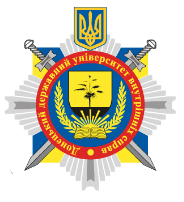THEORY AND VOCATION OF THE POLICE IN MODERN STATE STUDIES: INTERPRETATION OF M. FОUCAULT
DOI:
https://doi.org/10.32366/2709-9261-2021-2-2-39-48Keywords:
M. Foucault; modernism; episteme; police; political science; disciplinary society; panopticon.Abstract
The Foucault’s interpretation of the police, its theoretical substantiation, the range of powers and managerial tasks in modernist discourses. The French philosopher emphasized it should the modern concept of “police” does not coincide with its original theories of modern times. The doctrines of modern political scientists idealized the vocation of the police and identified it with the entire government, providing it with universal means of implementing the state interest. Considering the police from the perspective of “history of thought” Foucault notes that it is the unlimited nature of police functions gave the modern government to approve a disciplinary society, a new form of government - bio-power. This form of power totally controlled the individual, “took care of him” at all levels of biological life and, above all, the depths of consciousness - artificially created his authenticity. At the same time, in the theories of political scientists, the police received the status of a self-regulatory body, whose activities were not strictly controlled by state laws. In this case, the police, in the imaginary sense, is the living embodiment of state interest, morality and integrity, the formative and corrective body of state power. In order to form a disciplined and productive life, the police must direct individuals to regulation, to their temporal and hierarchical repetition. The a priori qualities of the police and its all-encompassing powers form the basis for the assertion of the idea of a “police state” and its radical form of panopticon. It is thanks to the idea of panopticon, its practical implementation by the police in modern society - the formation of disciplinary practice of continuous control in the social institutions of modernism.
References
Edgardo Castro. La noción de policía en los trabajos de Michel Foucault: objeto, límites, antinomias. Anuario Colombiano de Historia Social y de la Cultura. 2019. P. 185–206. URL: https://www.researchgate.net/ publication/334144385 (дата звернення: 10.07.2021).
Фуко М. Археология знания. К. : Ника-Центр, 1996. 208 с.
Фуко М. Нужно защищать общество : курс лекций, прочитанных в Коллеж де Франс в 1975–1976 учебном году. СПб. : Наука, 2005. 312 с.
Фуко М. Omnes et Sengulatim: К критике политического разума. Интеллектуалы и власть: Избранные политические статьи и интервью. М. : Праксис, 2005. Ч. 2. С. 285–319.
Фуко М. Субъект и власть. Интеллектуалы и власть: Избранные политические статьи и интервью. М. : Праксис, 2006. Ч. 3. С. 161–190.
Фуко М. История безумия в классическую эпоху. СПб., 1997. 576 с.
Фуко М. Искусство государственного управления. Интеллектуалы и власть: Избранные политические статьи и интервью. М. : Праксис, 2005. Ч. 2. С. 183–211.
Фуко М. Пытка – это разум. Интеллектуалы и власть: Избранные политические статьи и интервью. М. : Праксис, 2006. Ч. 3. С. 67–78.
Фуко М. Рождение социальной медицины. Интеллектуалы и власть: Избранные политические статьи и интервью. М. : Праксис, 2006. Ч. 3. С. 79–107.
Фуко М. Пространство, знание и власть. Интеллектуалы и власть: Избранные политические статьи и интервью. М. : Праксис, 2006. Ч. 3. С. 215–236.
Фуко М. Безопасность, территория, население : курс лекций, прочитанных в Коллеж де Франс в 1977–1978 учебном году. СПб. : Наука, 2011. 544 с.
Расков Д. Е. Камерализм книг: переводы Юсти в России XVIII века. Terra Economicus. 2019. № 17 (4), С. 62–79. URL: http://ecsocman.hse.ru/data/2020/01/03/1251886694/raskov.pdf (дата звернення: 15.06.2021).
Фуко М. Надзирать и наказывать. Рождение тюрьмы. М. : Ad Marginem, 1999. 480 с.
Andrew Johnson. Foucault: Critical Theory of the Police in a Neoliberal Age. 2014. Vol. 61, № 141. P. 5–29. URL: https://www.researchgate.net/publication/269998836 (дата звернення: 01.07.2021).
Куцепал С. В. Французька філософія другої половини ХХ століття: дискурс з префіксом «пост-» : монографія. К. : ПАРАПАН, 2004. 302 с.
Фуко М. Безумие и общество. Интеллектуалы и власть: Избранные политические статьи, выступления и интервью. М. : Праксис, 2002. С. 7–18.





